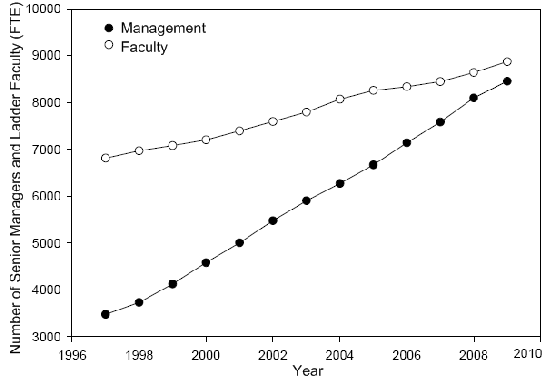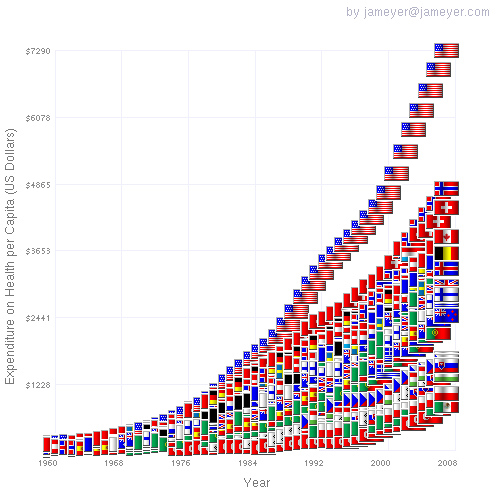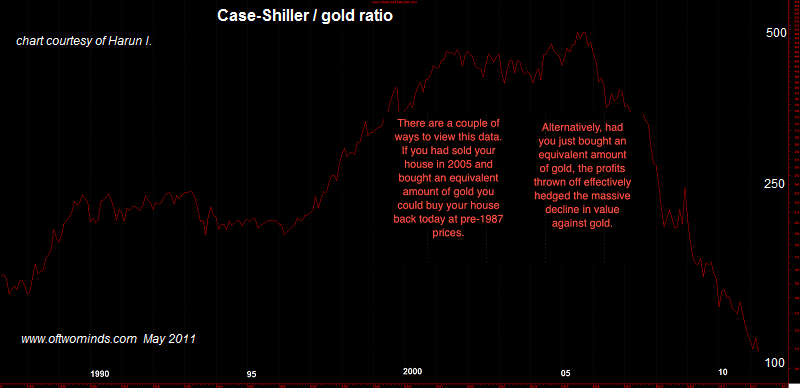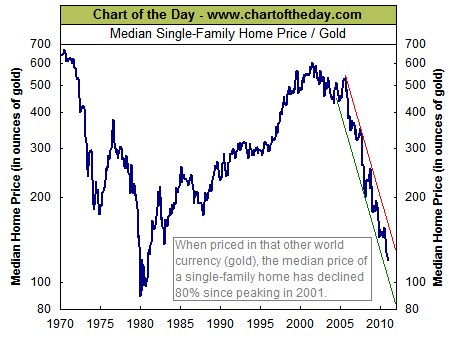The News Cycle: Full of Sound and Fury, Signifying Nothing
No wonder we're struggling; we're given tales told by idiots as "news" and "interpretation." The Mainstream Media has completely failed to make sense of the global financial crisis. By "make sense" I mean a framework of interpretation that properly attributes responsibility to the causes and players and which explains the key dynamics in common language. A framework of interpretation doesn't disappear in the next news cycle: it is constantly reinforced by additional interpretation and illumination. The news cycle now lasts at best the length of a playoff series. Mr. bin Laden's news cycle didn't even last as long as an NBA playoff; the demise of the "most dangerous man in the world" was shoved into the ashbin of history within a few days, with little interpretation beyond fist-pumping and a few fusty pontifications by the usual suspects, i.e. the "experts" trotted out during "big events" to explain it all away. The full quote from Macbeth (Act V, Scene V): It is a tale told by an idiot, full of sound and fury, signifying nothing. Every "news event" is terribly important, until a few hours later it is unimportant. This is a form of madness, a madness which goes unrecognized in the crazed, turbulent flood of "news." To be sure, a handful of people within the Mainstream Media (which now includes the Web aggregators such as HuffPo/AOL) do labor away at an honest account, but these reports are either buried beneath an avalanche of dross or they are touted (briefly, of course), as the Media's Potemkin Village: you see, we really are doing good journalism here. The ugly truth is the Mainstream Media now depends on adverts aimed at the top 10% of the populace for its survival. It's all well and good to talk about journalism, blah blah blah, but I've got a kid in private school and a mortgage, and the last thing this "news organization" needs is to undermine the advertisers by calling the entire Status Quo into question. Simply put, the top 10% of households are the ones paying the media's bills. Their consumption of goodies accounts for 40% of the entire U.S. economy, and so advertising rather naturally skews to serve their desires and aspirations. The debt-serfs and tax donkeys below (I raise my hand here) may have aspirations to the lux life, but with the home ATM shut down, costs for essentials floating ever higher and earnings in decline, their discretionary income approximates a shovel full of snow dumped on Death Valley asphalt in July. Local television stations limp along until a new election cycle disgorges a wave of pricey electioneering. Elections are an essential "profit center" for TV. Do you reckon that colors their coverage of the travesty of a mockery of a sham that is American politics? Of course it does: the Media is itself dependent on the charade being treated as "terribly important" when it is all just a money-driven tale told by idiots, full of sound and fury, signifying nothing. The essential framework of intepretation that is missing from the Mainstream Media is that the Status Quo is unsustainable and profound changes cannot be avoided. But rather than assemble a framework which might help us understand our limited pallette of hard choices, the Media distracts us with a frenzy of gossip, brightly packaged "news" that looks just like marketing and circus-like "thrills and spills" to entertain us between the "clash of gladiators." A handful of commentators understand this, and a few of those are occasionally given a bit of space amid the cacophany, again, to burnish the Potemkin Village image of the media as "responsible" and "providing a wide range of voices," blah blah blah. David Stockman is such a voice, relegated to the back pages/buried links or "financial section" where it can be overshadowed by the "earnings surprises" and "rising profits" stories:David Stockman, Reagan economist, on debt spree. The truth is that the Media is terrified of the coming transformation. Dependent as they are on adverts aimed at the top 10% (with a few grocery circulars for the bottom 90% to paw over, looking for bargains), the idea that the entire edifice is crumbling leaves them with no lifeline. There is a lifeline, but they are too afraid to see it: you could tell the truth. The truth is difficult, but it is something some people would pay for. It is, after all, one of the essentials of life. There is another idiot in the room: search engines which reward aggregation of meaningless sound and fury. If the Google et al. algorithms weighted original content as a 10 on a scale of 1 to 10, and any aggregated links to that content a 0 or a 1, then that would instantly change the incentives of the "game" of "attracting eyeballs" and thus advertisers. Right now, an aggregated link to this entry places higher in a search of the title than my own site, which is a Page Rank 5 site (i.e. it has a lot of "strong" links in and a lot of content). That is a snapshot of what is pushing the Media to spewing ever louder and more meaningless sounds and furies. If all the major search engines relegated aggregator links to the basement and rewarded original content, that would help right the sinking ship. The Mainstream Media is boxed in by its old models and its fear of the future. As its subscriber base melts away, it turns to precisely the worst "strategy," which is marketing to the top 10% of the populace which supports its advertising base, and giving that top tranch what they want to hear: everything's gonna be fine, profits are rising, we have a great lineup for Fall, the latest fashions are "gotta have," and all the other idiot's chatter of marketing which signifies nothing. By offering up an idiot's delight of "content" and fawning support of the Status Quo "story"--there is no need to transform anything, everything's fixed, there's plenty of everything forever, technology will seamlessly provide solutions to every vexing problem, our system (healthcare, politics, etc.) is the finest in the world, etc.--the Media and its search engine offshoots have failed the nation, profoundly, deeply and irrevocably. Of Two Minds Kindle edition: Of Two Minds blog-Kindle
Readers forum: DailyJava.net.
Order Survival+: Structuring Prosperity for Yourself and the Nation (free bits) (Mobi ebook) (Kindle) or Survival+ The Primer (Kindle) or Weblogs & New Media: Marketing in Crisis (free bits) (Kindle) or from your local bookseller.Thank you, Robert L. ($20), for your excellently generous contribution to this site -- I am greatly honored by your support and readership. Thank you, Robert D. ($50), for your exceedingly generous contribution to this site-- I am greatly honored by your support and readership.





























